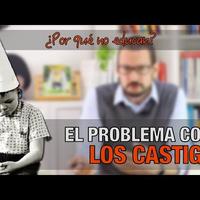El problema de los castigos: ¿por qué no educan?
Ya casi forma parte de la sabiduría popular eso de que es mejor evitar los castigos en
la educación, pero pese a ello, muchos padres (y por supuesto profesores, abuelos, etc)
siguen empleándolos de manera indiscriminada con sus hijos.
¿Qué efectos puede tener el castigo?, ¿por qué es mejor evitarlos?
Vamos a verlo.
Con el tiempo se ha tendido a priorizar el empleo de refuerzos por encima de los castigos;
de hecho el propio Skinner, padre del conductismo, señalaba que la búsqueda de alternativas
al castigo es un indicio de civilización.
Y se busca evitar el empleo de castigos no porque estos no funcionen, que lo hacen, al
menos a corto plazo; sino porque su uso conlleva una serie de efectos que no son deseables.
Hay bastante investigación acerca de las consecuencias negativas asociadas al empleo
de los castigos, que se pueden resumir en las siguientes: PRIMERO, el castigo genera
una serie de respuestas emocionales negativas en quien lo recibe (por ejemplo miedo, rabia,
ansiedad, etc.);
SEGUNDO, genera un modelo negativo de conducta que más adelante se puede tender a imitar;
TERCERO, interfiere en la calidad de la relación entre el castigador y el castigado, lo cual
acaba haciendo que el castigado (habitualmente el hijo) no quiera ver ni en pintura al castigador
(habitualmente, uno de sus padres); en CUARTO lugar, se puede producir lo que se conoce
como “sustitución de la respuesta”, esto es, que la conducta castigada se sustituye
por otra igualmente indeseable; y, QUINTO, a veces puede incluso producir un incremento
de la respuesta castigada o una disminución en otras que sí son positivas.
Por estos motivos actualmente prefiere evitar el empleo del castigo en pro de otras técnicas
de conducta basadas en el refuerzo o en la extinción.
Pero ojo, todas estas consecuencias no se limitan, como podría parecer, al empleo de
los castigos físicos, sino de cualquier tipo de castigo, como por ejemplo, la retirada
de privilegios, el clásico “pues te quedas sin lo que sea”.
Este es el tipo de castigo que más suelen emplear los padres y, aunque parecen mucho
más razonables que otros más severos y con los que la mayoría de la gente no está de
acuerdo, tampoco se libran de algunos problemas: no suelen guardar relación con la conducta
que se pretende corregir, no son contingentes (esto es, que no se aplican inmediatamente
después de la conducta) y no requieren realmente un esfuerzo por parte del niño.
Por ejemplo, ¿qué tendrá que ver que haya derramado la leche con que no baje al parque?,
¿o que haya pegado a un niño en el parque con que se quede sin ver la tele?
Pero además del tipo de castigo que se aplique, otro problema es la frecuencia con la que
se utilizan.
Porque cuando se hace en exceso, pierde fuerza y los niños se hacen insensibles a este.
La de padres que acuden a consulta diciendo: ”le hemos quitado la tele, la tablet, sus
juguetes favoritos, le hemos dejado sin parque… se lo hemos quitado todo pero parece que le
da igual”.
Y es que a veces parece que el fin del castigo sea “fastidiar al niño para que aprenda”,
ya sea en forma de dolor físico o emocional; como si el valor educativo dependiera del
grado en el que sufre el niño.
Por eso a veces los padres llegan a ridiculizar o humillar a los hijos con el objetivo de
que estos “aprendan”.
Y sí, es verdad que aprenden, pero quizá no lo que sus padres quieren: este tipo de
medidas lo que promueven es la rabia del niño, y la rabia no le lleva precisamente a pensar
en querer portarse bien.
Otro problema es que el castigo, en muchas ocasiones, es algo improvisado que se hace
en caliente; por lo que en muchas ocasiones se reduce a una situación en la que los padres
se enfadan, pierden los papeles, gritan a sus hijos y les aplican una consecuencia desproporcionada
e impulsiva, a modo de pequeña venganza.
Y todos sabemos que cuando se hacen las cosas en caliente no se hacen de la mejor forma,
con lo que muchas veces esas medidas exageradas al final no se mantienen, con lo que además
los padres pierden credibilidad.
Esto puede alimentar en el niño la idea de que “da igual lo que haga, y da igual lo
que mis padres digan, porque al final nunca pasa nada”.
Y eso tampoco es bueno.
Por lo tanto, si entendemos el castigo en estos términos, como un método que parece
destinado a fastidiar al niño para que aprenda, desproporcionado, que no guarda relación
con la conducta que queremos cambiar, que se improvisa, etc. entonces además de ser
éticamente cuestionable el pretender lograr cosas mediante amenazas, es que ni si quiera
es útil desde un punto de vista pedagógico.
Porque al final los niños lo único que acaban aprendiendo es cómo llevar a cabo las conductas
que queremos corregir sin ser descubiertos para evitar esos castigos, pero no llegan
a aprender los motivos que hay tras la desaprobación de sus padres, ni el modo correcto de comportarse.
Y hasta aquí, otra píldora de psicología, si os ha gustado tenéis muchos más vídeos
y artículos en el canal de YouTube y en albertosoler.es.
Y en todas las librerías nuestro libro “Hijos y Padres Felices”.
¡Un saludo!

